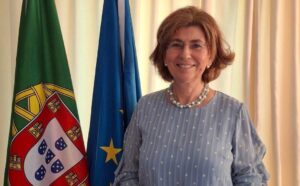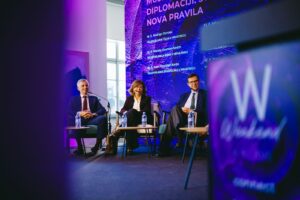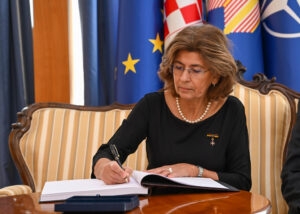There is potential for further development of mutually beneficial businesses in areas such as digitalization, renewable energy, agriculture, science or health. Croatia is a very popular destination for the Portuguese, not only in terms of tourism, for the holidays, but also to study and go on ERASMUS, for Diplomacy&Commerce says H. E. Maria Manuel Durão , Ambassador of Portugal to Croatia. The coast and islands of Croatia have an excellent reputation in my country, from Istria through Dalmatia to Dubrovnik, says Mrs Manuel Durão. In an exclusive interview for our magazine, she reveals the possibilities of economic cooperation between Croatia and Portugal, as well as cultural ones that are in the embassy’s plans.

- Croatia and Portugal are two relatively similar countries. Both base a large part of their development on tourism, they are members of the EU, NATO. How would you assess the relations between the two countries?
Portugal recognized Croatia’s independence on the 15th of January, 1992, coincidentally during the Portuguese Presidency of the European Economic Community. Diplomatic relations between the two countries were established soon after, on the 3rd of February of the same year. During these more than 30 years, the relationship has been very friendly and increasingly closer, both bilaterally and, since 2013, also as members of the European Union and as partners of the Schengen Area in 2023. In the European Union, the two countries, recognizing the importance of the European project, share common goals and challenges, and defend the values of cohesion, human development, and solidarity. In fact, the successful cooperation between our two countries during our respective EU Presidencies has been a testament to the deep mutual understanding between them and their capacity of collaborating at EU level. Also as NATO partners, both Portugal and Croatia share the core values of the alliance, such as collective defence, democracy and respect for the rule of law. But if we return to older times, historically, we cannot forget the close ties between Portugal and the then Republic of Ragusa, both seafaring peoples. This connection with the sea is one of the characteristics that define our people and a fundamental cultural element that brings us closer.
- Are there any “issues” between the two countries and what would you single out as the most important or challenging in the development of relations between the official Zagreb and Lisbon?
The truth is that over these 33 years we have not registered any specific challenges to our relations. Of course, there is always room for improvement, and that is always our ambition: to further strengthen bilateral relations at the political, economic and cultural levels, and to deepen our cooperation in the context of the European Union, NATO, the United Nations and other multilateral forums with an international dimension, where we often share the same views. And it is in this sense that we have been working, not only in order to improve and update the framework instruments around our cooperation, but also to intensify contacts and visits at the most varied levels, with a view of multiplying our exchanges, namely regarding trade.

- Economic cooperation is the most important segment of the development of relations, in addition to political prerequisites. What do the numbers show, how developed is it, which areas and where do you see room for improvement?
Economic cooperation is probably one of the areas that is most challenging nowadays. Our relationship in this domain has not been particularly strong and our trade figures are below what we would like to have. It is true that the two countries are located at opposite sides of Europe and their focus may be on other geographically or historically closer markets, but this should not necessarily represent an obstacle. Rather, it should be seen as an opportunity for our countries to get to know each other better. And it is in this sense that we are working to try to bring companies together by arranging business meetings to promote information and experience exchanges on both sides, so that the areas of common interest can be identified, investment can be fostered, and trade can be strengthened. There is certainly potential for further development of mutually beneficial businesses in areas such as digitalization, renewable energy, agriculture, science or health. And there are already very successful projects underway that we strongly encourage, such as the collaboration between the Croatian municipality of Benkovac, in the county of Zadar, and the Portuguese city of Alenquer, in the wine sector, which can be an important asset for both countries. This is an area of mutual interest where cooperation could also be intensified. As for tourism, flows between the two countries have also been growing.
- We mentioned tourism. Portugal is a tourist superpower. Last year, 26.5 million foreign tourists visited your country, which is the most in history. Compared to 2022, the number of tourists increased by 19.2 percent. What is the development of your tourism based on and do you see any link with Croatian tourism?
Tourism in Portugal has indeed shown a remarkable recovery after the impact of the COVID-19 pandemic and continues to assert itself as one of the pillars of the Portuguese economy, stimulating not only economic growth, but also the enhancement of territories and communities. Portugal has attracted more and more visitors, driven by urban tourism, nature tourism and the appreciation of gastronomy and wine tourism. According to the World Tourism Organization, in 2023, Portugal was the 15th receiving market for tourists and 9th in Europe (26.5 million). Data for 2024 confirm this dynamism, pointing to more than 30 million guests, and in 2025 this growing trend is expected to continue. This is of course a very high number of tourists in proportion to the Portuguese population. Croatia faces a similar challenge. Therefore, particular attention has been paid to the potential negative impacts of this, namely at the environmental level, and Portugal has been implementing several initiatives to promote sustainable tourism practices, such as encouraging rural and ecological tourism. It has also invested significantly in the digitalization of the sector, with the implementation of advanced technologies to improve the tourist experience and the operational efficiency of tourism services. After some difficulties in the past, Portugal has sought to take a proactive approach to risk management and in the implementation of strategies to increase the resilience of the tourism sector, including the continuous training of tourism professionals and the creation of an emergency fund for the sector. Conscious of the importance of tourism and its contribution to promote broader friendly relations, Portugal and Croatia signed an agreement which constitutes the legal framework of their cooperation in this field.

- How well do Portuguese people know Croatia and what do you recommend to them when they ask you when they want to come, what to visit, what to try? In this regard, what do you recommend to all of us who are planning to visit Portugal to try, see?
The connection with the sea, so important for our two peoples, is always very attractive. But, in addition to the Coast, I always recommend the Plitvice Natural Park, which is absolutely wonderful, or the region of Krapina and Varazdin. Recently I went to Baranja and I also found those very green and fertile plains extremely beautiful. Throughout the country I have been warmly welcomed and have been experiencing the excellence of the gastronomy, which makes the stay in Croatia very pleasant. As for Portugal, it is a country with a great diversity of landscapes and historical heritage, found not only in large cities, such as Lisbon, Porto, Coimbra or Évora, but also in small towns or villages. The city of Guimarães, the “cradle of Portuguese nationality”, which last year signed a cooperation agreement with Varazdin, or the village of Arouca, in the North, where there is a beautiful baroque monastery and which has been developing a partnership with the Castle of Trakoscan, are places I highly recommend. For beach lovers, in addition to the multiple beaches along the Atlantic coast, there are beautiful river beaches. Not to be missed is also a boat trip to enjoy the landscape of the Douro wine region, declared a UNESCO world heritage site. The Portuguese gastronomy, rich and varied, like its landscape, also offers visitors a unique experience.
I think that the Portuguese and Croatians are aware of the beauty of both countries because the tourist flows between Croatia and Portugal have been growing consistently in recent years, and I hope that this trend will continue in the future, and that it can be facilitated by the re-establishment of direct flights between the two countries.
- Cultural cooperation and exchange is very important for getting to know other peoples and understanding similarities and differences. What would you highlight from the Embassy’s plans in this field?
It is with great satisfaction that I have been seeing the interest and curiosity of Croatians regarding Portuguese culture. And the activities that we have been developing in this area have been very diverse: from music to cinema, photography, dance or literature, we try to carry them throughout Croatia. The Embassy prepares an annual plan of cultural activities in which, in addition to trying to ensure Portuguese participation in various festivals that take place here in Croatia, it also includes initiatives with specific partners, Croatian entities or other countries, as well as commemorative events of specific dates, thus trying to make our history and culture known. We were, for example, the partner country of the 54th Varaždin Baroque Evenings last year, which was an honour for us, and which allowed us to present a set of shows and exhibitions very representative of Portuguese music and art. We have also been participating in the Sibenik Dance Festival, and this year we organized two film cycles, in partnership with other Portuguese-speaking countries, in Zagreb and Karlovac, to mark the World Portuguese Language Day. And we have been sponsoring several events in the area of literature. The learning of the Portuguese language is also a priority for us, not only at university level but also at the secondary school level. We therefore maintain good and strong relations with the University of Zagreb, where there is a Chair (Catedra) of Portuguese, with excellent professors, and where we also provide a lecturer. But also with universities in other cities, where in some of them, for instance in Zadar, Portuguese language classes will soon happen for the first time. With several high schools, with which we have cooperation protocols, we also try to maintain close contact.
These cultural exchanges between Portugal and Croatia, which we will continue to promote, have naturally contributed to an enrichment of the ties between our two peoples, arousing greater curiosity for knowledge of our respective countries.